"Reporting by Rishabh Jaiswal and Gursimran Kaur in Bengaluru; Editing by Rashmi Aich". Ironic - more white collar, college educated jobs reduced - offshore to India, AI/ML? How are they going to pay back those college loans of if the corporate, white collar jobs get reduced?(Reuters) - CVS Health is shedding 5,000 jobs to help reduce costs as the U.S. pharmacy chain sharpens its focus on healthcare services, the Wall Street Journal reported on Monday.
CVS added that the jobs affected will primarily be corporate positions, according to the report, citing a memo reviewed by WSJ.
CVS did not immediately respond to a Reuters request for comment.
/cloudfront-us-east-2.images.arcpublishing.com/reuters/PRVR2DG6XJOQNIPBQG2HY77SQI.jpg)
CVS to shed 5,000 jobs in cost-cutting push, Wall Street Journal reports
U.S. pharmacy chain CVS Health is cutting 5,000 jobs, the Wall Street Journal reported on Monday, citing a staff memo.www.reuters.com
Join the Hide community
Get access to live stream, lessons, the post exchange, and chat with other snipers.
Register
Download Gravity Ballistics
Get help to accurately calculate and scope your sniper rifle using real shooting data.

Install the app
How to install the app on iOS
Follow along with the video below to see how to install our site as a web app on your home screen.
Note: This feature may not be available in some browsers.
You are using an out of date browser. It may not display this or other websites correctly.
You should upgrade or use an alternative browser.
You should upgrade or use an alternative browser.
Recession - 2022 / 2023 / 2024
- Thread starter Hobo Hilton
- Start date
Aug 5 (Reuters) - The U.S. Federal Reserve will likely need to raise interest rates further to bring down inflation, Governor Michelle Bowman said on Saturday.
Bowman said she supported the Fed's quarter-point increase in interest rates last month, given still-high inflation, strong consumer spending, a rebound in the housing market and a labor market that is helping to feed higher prices.
"I also expect that additional rate increases will likely be needed to get inflation on a path down to the FOMC’s 2 percent target," she said in remarks prepared for delivery to the Kansas Bankers Association, referring to the Fed's rate-setting panel, the Federal Open Market Committee.
/cloudfront-us-east-2.images.arcpublishing.com/reuters/NNCKWFLVOJKRRFDSK3W7M7TWKU.jpg)
 www.reuters.com
www.reuters.com
Bowman said she supported the Fed's quarter-point increase in interest rates last month, given still-high inflation, strong consumer spending, a rebound in the housing market and a labor market that is helping to feed higher prices.
"I also expect that additional rate increases will likely be needed to get inflation on a path down to the FOMC’s 2 percent target," she said in remarks prepared for delivery to the Kansas Bankers Association, referring to the Fed's rate-setting panel, the Federal Open Market Committee.
/cloudfront-us-east-2.images.arcpublishing.com/reuters/NNCKWFLVOJKRRFDSK3W7M7TWKU.jpg)
Fed's Bowman says more US rate hikes likely will be needed
The U.S. Federal Reserve will likely need to raise interest rates further to bring down inflation, Governor Michelle Bowman said on Saturday.
Student loan repayments start again in Sept/Oct after a three year pause. 4th qtr should be interesting.
I provide student loan relief for women 18 (19 in some states) and older.
Seeking Alpha today:
"The market indexes were down for the week, but given the events, it might be surprising how little they were down. On Tuesday, Fitch downgraded U.S. debt from AAA to AA+. This is only the second time in history that U.S. debt has been downgraded. The S&P 500 fell 2.4% for the week. When the S&P downgraded U.S. debt in 2011, the S&P sold off 6.7% in a single day. Overall, the market's response to the downgrade can be described as a yawn. Though some are worried about the news. We'll take a look back at what happened in 2011.
Other economic news that came out last week include the jobs report and the ISM surveys. While the narrative in the financial news media has increasingly focused on the possibility of a "soft landing", when I look at the data, I see warning signs all over the place.
Perhaps the most certain conclusion that can be reached by looking at the data is that the COVID surge created by companies racing to catch up with demand is over. Jobs data has returned to normal levels, and forward demand indicators like the ISM Manufacturing Survey suggest that future demand is low."
"The market indexes were down for the week, but given the events, it might be surprising how little they were down. On Tuesday, Fitch downgraded U.S. debt from AAA to AA+. This is only the second time in history that U.S. debt has been downgraded. The S&P 500 fell 2.4% for the week. When the S&P downgraded U.S. debt in 2011, the S&P sold off 6.7% in a single day. Overall, the market's response to the downgrade can be described as a yawn. Though some are worried about the news. We'll take a look back at what happened in 2011.
Other economic news that came out last week include the jobs report and the ISM surveys. While the narrative in the financial news media has increasingly focused on the possibility of a "soft landing", when I look at the data, I see warning signs all over the place.
Perhaps the most certain conclusion that can be reached by looking at the data is that the COVID surge created by companies racing to catch up with demand is over. Jobs data has returned to normal levels, and forward demand indicators like the ISM Manufacturing Survey suggest that future demand is low."
To "oversimplify" my view... Manufacturers and retailers will be selling less while charging more. Perhaps not in the double digits but in the high single digits, like 7% to 8%. Those buying supplies on the futures market will do well... But that can turn into a bear trap overnight.Seeking Alpha today:
"The market indexes were down for the week, but given the events, it might be surprising how little they were down. On Tuesday, Fitch downgraded U.S. debt from AAA to AA+. This is only the second time in history that U.S. debt has been downgraded. The S&P 500 fell 2.4% for the week. When the S&P downgraded U.S. debt in 2011, the S&P sold off 6.7% in a single day. Overall, the market's response to the downgrade can be described as a yawn. Though some are worried about the news. We'll take a look back at what happened in 2011.
Other economic news that came out last week include the jobs report and the ISM surveys. While the narrative in the financial news media has increasingly focused on the possibility of a "soft landing", when I look at the data, I see warning signs all over the place.
Perhaps the most certain conclusion that can be reached by looking at the data is that the COVID surge created by companies racing to catch up with demand is over. Jobs data has returned to normal levels, and forward demand indicators like the ISM Manufacturing Survey suggest that future demand is low."
Some prices will never come down. The Great Reset.
Historically, prior to a recession, the "Rental Companies" do well. URI is but one example. The equipment manufacturer's with rental divisions also do well.,
Contractor's, individuals, farmers, trash haulers, etc will rent a piece of equipment "just in case" the bottom falls out of the financial world and contracts are cancelled.
URI - Up 30% in 3 months (+/-).... A few hurricanes, wild fires and earthquakes and I will be a buyer... LOL

Contractor's, individuals, farmers, trash haulers, etc will rent a piece of equipment "just in case" the bottom falls out of the financial world and contracts are cancelled.
URI - Up 30% in 3 months (+/-).... A few hurricanes, wild fires and earthquakes and I will be a buyer... LOL
Wallstreet Breakfast:
"One of the biggest companies behind the remote work revolution is having its employees head back to the office. Staff who live within 50 miles of a Zoom Video (ZM) workplace must now be there at least two days per week, further cementing an industry shift towards hybrid models of work. It's also big news for a company that beat Microsoft Skype (MSFT), Cisco Webex (CSCO) and Google Meet (GOOG, GOOGL) at their own game, and led the word "Zoom" to be synonymous with video-calling for entire industries."
The irony of Zoom making employees work from the office at least 2 days per week!
"One of the biggest companies behind the remote work revolution is having its employees head back to the office. Staff who live within 50 miles of a Zoom Video (ZM) workplace must now be there at least two days per week, further cementing an industry shift towards hybrid models of work. It's also big news for a company that beat Microsoft Skype (MSFT), Cisco Webex (CSCO) and Google Meet (GOOG, GOOGL) at their own game, and led the word "Zoom" to be synonymous with video-calling for entire industries."
The irony of Zoom making employees work from the office at least 2 days per week!
Wallstreet Breakfast:
"Placing the blame squarely on the Teamsters, cash-strapped Yellow Corp (YELL) has filed for bankruptcy, leading its stock to sink over 25% in premarket trading. The trucker now expects to enter into a debtor-in-possession financing facility, which will be used to support its businesses throughout the sale process. Yellow has more than 100K creditors, the biggest of which include BNSF Railway (BRK.B), Amazon (AMZN) and Home Depot (HD). Meanwhile, retail investors have been cashing in on Yellow's woes in an old-fashioned meme-stock rally that pushed its shares up 400% since its operations were shuttered"
"Placing the blame squarely on the Teamsters, cash-strapped Yellow Corp (YELL) has filed for bankruptcy, leading its stock to sink over 25% in premarket trading. The trucker now expects to enter into a debtor-in-possession financing facility, which will be used to support its businesses throughout the sale process. Yellow has more than 100K creditors, the biggest of which include BNSF Railway (BRK.B), Amazon (AMZN) and Home Depot (HD). Meanwhile, retail investors have been cashing in on Yellow's woes in an old-fashioned meme-stock rally that pushed its shares up 400% since its operations were shuttered"
History is repeating itself:
Record borrowing is just under $5 trillion, even as credit card use dropped
The numbers: Consumer credit rose $17.8 billion in June, up from a $9.5 billion gain in the prior month, the Federal Reserve said Monday. That translates into a 4.3% annual rate. Credit growth rose at a revised 2.3% gain in June, higher than the initial estimate of a 1.3% gain.
Economists had been expecting a $11 billion gain, according to the Wall Street Journal forecast.
Key details: All of the gain came in nonrevolving credit, typically auto and student loans. This borrowing rose 6% in June, up sharply from a 0.3% growth rate in the prior month. This category of credit is usually much less volatile.
 www.morningstar.com
www.morningstar.com
Record borrowing is just under $5 trillion, even as credit card use dropped
The numbers: Consumer credit rose $17.8 billion in June, up from a $9.5 billion gain in the prior month, the Federal Reserve said Monday. That translates into a 4.3% annual rate. Credit growth rose at a revised 2.3% gain in June, higher than the initial estimate of a 1.3% gain.
Economists had been expecting a $11 billion gain, according to the Wall Street Journal forecast.
Key details: All of the gain came in nonrevolving credit, typically auto and student loans. This borrowing rose 6% in June, up sharply from a 0.3% growth rate in the prior month. This category of credit is usually much less volatile.
Consumer borrowing picked up in June, latest Fed data show
Obviously the FED Reserve has become "politicized". Look closely and the 51% / 49% situation on voting within that group. While the 49% are vocal about raising interest rates to tame inflation, they are out voted by the 51% to not raise the interest rate. Mega banks and brokers continue to charge much higher interest rates for a consumer to borrow their money. Inflation will continue until the collapse and the mega money people and companies will come out well. "We the People" will be on the losing end of the deal. Alter your lifestyle to move yourself as far away from the USD as possible. If you do not have cash to buy something then don't put it on a credit card. Produce raised in a garden will keep you out of the grocery store. Shopping at the thrift stores keeps the tax man out of your pocket...
______________________
“Absent any alarming new data between now and mid-September, I believe we may be at the point where we can be patient and hold rates steady and let the monetary policy actions we have taken do their work,” Harker said in prepared remarks for a speech in Philadelphia.


 www.cnbc.com
www.cnbc.com
______________________
“Absent any alarming new data between now and mid-September, I believe we may be at the point where we can be patient and hold rates steady and let the monetary policy actions we have taken do their work,” Harker said in prepared remarks for a speech in Philadelphia.

Philadelphia Fed President Patrick Harker suggests interest rate hikes are at an end
A voter this year on the rate-setting FOMC, Harker noted progress in the fight against inflation and confidence in the economy.
It does not appear that Moody's has become "Politicized".
I put more stock in Moody's than the FED Reserve.
______________________
Moody’s has put the credit ratings of six large US banks, including Bank of New York Mellon, State Street and Northern Trust, under review for a possible downgrade, sending stocks tumbling as investors worried about more banking sector pain ahead.
The credit ratings agency said late Monday that its warning on the three banks reflected “ongoing strain” in the US banking sector, including increased pressures on funding and potential “weaknesses” in the amount of capital lenders are required to hold.
I put more stock in Moody's than the FED Reserve.
______________________
Moody’s has put the credit ratings of six large US banks, including Bank of New York Mellon, State Street and Northern Trust, under review for a possible downgrade, sending stocks tumbling as investors worried about more banking sector pain ahead.
The credit ratings agency said late Monday that its warning on the three banks reflected “ongoing strain” in the US banking sector, including increased pressures on funding and potential “weaknesses” in the amount of capital lenders are required to hold.
UPS’s tentative labor deal with the Teamsters hasn’t even taken effect yet. But it has already taken a bite out of its earnings and revenue, as both fell in the second quarter ahead of the deal being reached.
The company also cut its profit forecast, expecting narrower margins, as it works to win back customers who shifted to other services for fear there would be an August 1 strike by the 340,000 Teamsters at the company.
_____________________
LOL... Blame it on the Teamsters... What ever you do, don't blane it on the FED Reserve for sitting on it's ass as inflation spiraled. If America was in a full blown recession today, the Teamsters would simply take a "roll over" of the contract and be glad to get it. FED reserve actions, part of the "Great Reset".

 www.kitv.com
www.kitv.com
The company also cut its profit forecast, expecting narrower margins, as it works to win back customers who shifted to other services for fear there would be an August 1 strike by the 340,000 Teamsters at the company.
_____________________
LOL... Blame it on the Teamsters... What ever you do, don't blane it on the FED Reserve for sitting on it's ass as inflation spiraled. If America was in a full blown recession today, the Teamsters would simply take a "roll over" of the contract and be glad to get it. FED reserve actions, part of the "Great Reset".

UPS says its profit will fall after it reaches a Teamsters deal
New York (CNN) — UPS’s tentative labor deal with the Teamsters hasn’t even taken effect yet. But it has already taken a bite out of its earnings and revenue, as
The Fed Hits 3,000% Inflation | ZeroHedge
ZeroHedge - On a long enough timeline, the survival rate for everyone drops to zero
"It was only two months ago that Wall Street Breakfast: Put It On Plastic discussed the $1T U.S. credit card debt milestone, but it has now finally happened. Balances topped the record in Q2 as consumers continued to spend, according to the New York Fed's Quarterly Report on Household Debt and Credit. The number of credit card accounts also increased by 5.48M to 578.35M, while the total limits on credit card accounts rose by $9B to a total of $4.6T.
As mentioned previously: High inflation is pushing more consumers to put non-discretionary spending on cards, while others may be having a harder time paring back their lifestyles despite the price pressures. Interest rates are compounding the issue, with the average annual percentage rate over 20%, making it a costly debt for consumers. It's also higher than at any point since the Fed started tracking card APRs in 1994, contributing to the overall U.S. household debt that topped $17T in Q1.
Meanwhile, the flow into serious delinquency (that is, 90 days or more delinquent) for credit cards rose to 5.08% of total credit card balances in Q2, from 3.35% in Q1. However, that figure is "normalized" with pre-COVID levels, as during the pandemic, changes in buying patterns, fiscal stimulus, and forbearance programs kept delinquency rates low. Credit card issuers will also report their July delinquency and net charge-off rates next week to get a better view on the industry."
As mentioned previously: High inflation is pushing more consumers to put non-discretionary spending on cards, while others may be having a harder time paring back their lifestyles despite the price pressures. Interest rates are compounding the issue, with the average annual percentage rate over 20%, making it a costly debt for consumers. It's also higher than at any point since the Fed started tracking card APRs in 1994, contributing to the overall U.S. household debt that topped $17T in Q1.
Meanwhile, the flow into serious delinquency (that is, 90 days or more delinquent) for credit cards rose to 5.08% of total credit card balances in Q2, from 3.35% in Q1. However, that figure is "normalized" with pre-COVID levels, as during the pandemic, changes in buying patterns, fiscal stimulus, and forbearance programs kept delinquency rates low. Credit card issuers will also report their July delinquency and net charge-off rates next week to get a better view on the industry."
If you think about it... Consumers are simply putting "inflation" on credit cards. Many items they could afford 2 - 3 years ago have gone up in price to where they can't be paid for with the same old pay check."It was only two months ago that Wall Street Breakfast: Put It On Plastic discussed the $1T U.S. credit card debt milestone, but it has now finally happened. Balances topped the record in Q2 as consumers continued to spend, according to the New York Fed's Quarterly Report on Household Debt and Credit. The number of credit card accounts also increased by 5.48M to 578.35M, while the total limits on credit card accounts rose by $9B to a total of $4.6T.
As mentioned previously: High inflation is pushing more consumers to put non-discretionary spending on cards, while others may be having a harder time paring back their lifestyles despite the price pressures. Interest rates are compounding the issue, with the average annual percentage rate over 20%, making it a costly debt for consumers. It's also higher than at any point since the Fed started tracking card APRs in 1994, contributing to the overall U.S. household debt that topped $17T in Q1.
Meanwhile, the flow into serious delinquency (that is, 90 days or more delinquent) for credit cards rose to 5.08% of total credit card balances in Q2, from 3.35% in Q1. However, that figure is "normalized" with pre-COVID levels, as during the pandemic, changes in buying patterns, fiscal stimulus, and forbearance programs kept delinquency rates low. Credit card issuers will also report their July delinquency and net charge-off rates next week to get a better view on the industry."
Similar to compounding interest while buying blue sky or taking out a loan for the down payment on a new vehicle and then trying to pay off two loans on one vehicle.
So far, the US economy still looks "good" as consumer spending continues - at some point credit cards are maxxed, rent/mortgage payments high, car loans high; and, then people stop buying stuff and then the personal bankruptcies start. Suddenly US economy is not so good.If you think about it... Consumers are simply putting "inflation" on credit cards. Many items they could afford 2 - 3 years ago have gone up in price to where they can't be paid for with the same old pay check.
Similar to compounding interest while buying blue sky or taking out a loan for the down payment on a new vehicle and then trying to pay off two loans on one vehicle.
Reading articles about REITs - rent for residential, commercial, etc. go up in 1 year, 3 year, etc. increments and rent increases are backward looking (ie - back toward high inflation). Renters are going to be in for a rude shock.
"With Federal Reserve data showing household debt climbing above $17 trillion, the average American household is just over $14,000 away from reaching a “breaking point” at which it will be unable to continue paying off loans, according to a study by WalletHub.
The New York Federal Reserve reported on Aug. 8 that overall household debt ticked up by $16 billion in the second quarter, or 0.1 percent, to $17.06 trillion.
An analysis of the Fed data by WalletHub showed that, at the end of the second quarter, the average U.S. household owed a total of $143,762. That’s a little over $14,000 below WalletHub’s projected breaking point for household finances, which is a point at which people can’t keep up with paying their bills.
“Based on our analysis of debt during the Great Recession, the average household is about $14,339 away from truly having to worry about defaulting,” Jill Gonzalez, WalletHub analyst, told The Epoch Times in an emailed statement.
The Fed data showed that much of the increase in second-quarter household debt was driven by a jump in credit card balances, which for the first time ever surpassed $1 trillion."
Epoch Times, 8/9/2023
The New York Federal Reserve reported on Aug. 8 that overall household debt ticked up by $16 billion in the second quarter, or 0.1 percent, to $17.06 trillion.
An analysis of the Fed data by WalletHub showed that, at the end of the second quarter, the average U.S. household owed a total of $143,762. That’s a little over $14,000 below WalletHub’s projected breaking point for household finances, which is a point at which people can’t keep up with paying their bills.
“Based on our analysis of debt during the Great Recession, the average household is about $14,339 away from truly having to worry about defaulting,” Jill Gonzalez, WalletHub analyst, told The Epoch Times in an emailed statement.
The Fed data showed that much of the increase in second-quarter household debt was driven by a jump in credit card balances, which for the first time ever surpassed $1 trillion."
Epoch Times, 8/9/2023

College is more expensive than ever. Here's how families are paying the tab
To cover the rising cost of college, most families have to rely on a combination of resources, including loans, to make it work.
Meanwhile - US military begging for recruits and offering GI Bill and other forms of educational assistance. No sympathy.
College is more expensive than ever. Here's how families are paying the tab
To cover the rising cost of college, most families have to rely on a combination of resources, including loans, to make it work.www.cnbc.com
Higher oil prices could trigger inflation fears again, undoing part of the central banks’ efforts of the past year to tame soaring consumer prices.
The fundamentals picture of the oil market looks much more bullish than just a month ago, as demand remains resilient despite concerns of slowing economies, while supply is shrinking thanks to the cuts from OPEC+ and Saudi Arabia.
But higher oil prices, which lead to higher gasoline and overall energy prices, could start seeping into core inflation again, even if the headline index excludes food and energy prices. If higher energy prices impact the inflation core again, the ‘soft landing’ hopes could begin to fade and prompt the Fed and other central banks to continue with the interest rate hikes, unlike most current expectations that the end of the rate-hike cycles is near.

 oilprice.com
oilprice.com
The fundamentals picture of the oil market looks much more bullish than just a month ago, as demand remains resilient despite concerns of slowing economies, while supply is shrinking thanks to the cuts from OPEC+ and Saudi Arabia.
But higher oil prices, which lead to higher gasoline and overall energy prices, could start seeping into core inflation again, even if the headline index excludes food and energy prices. If higher energy prices impact the inflation core again, the ‘soft landing’ hopes could begin to fade and prompt the Fed and other central banks to continue with the interest rate hikes, unlike most current expectations that the end of the rate-hike cycles is near.

Rising Oil Prices Could Threaten Fed’s Soft Landing | OilPrice.com
Resilient crude oil demand in the world’s largest economies could lead to higher crude prices and stoke inflation
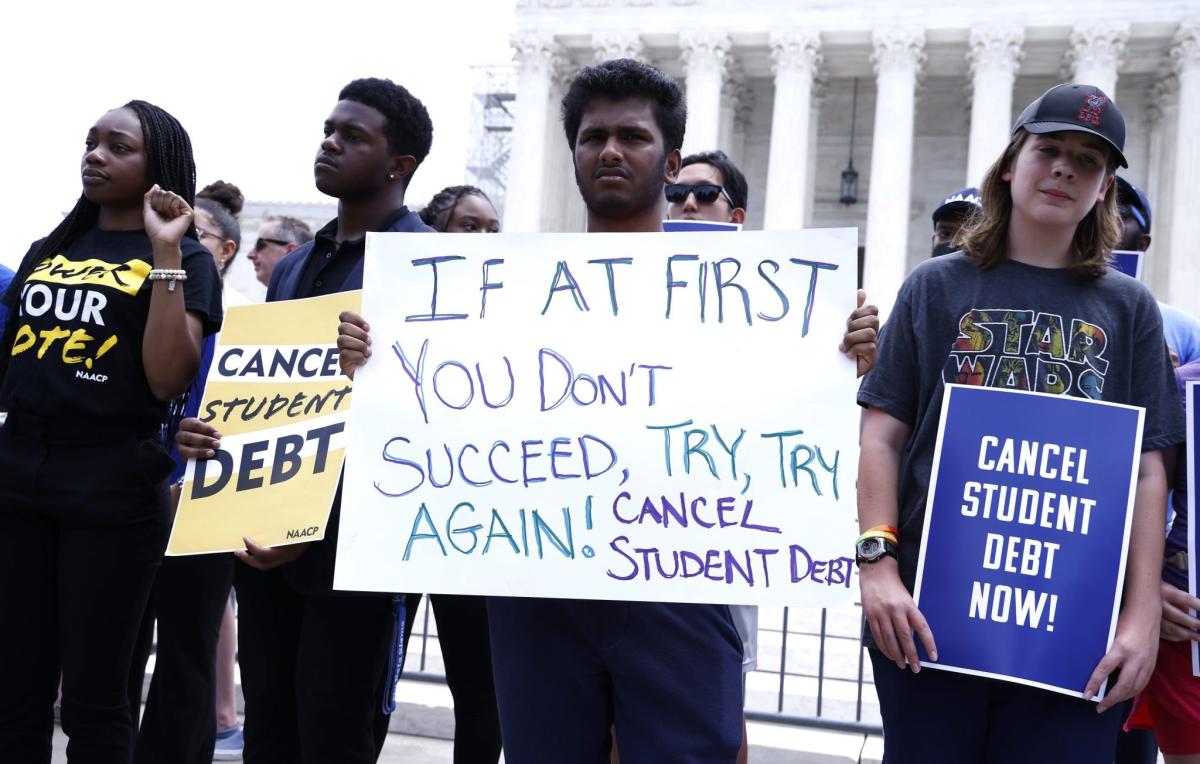
If you can’t afford your federal student loan bills, just skip them
Take advantage of Biden’s student loan grace period.
Best financial advice I’ve ever read…
Maybe this will finally start the recession? @Hobo Hilton you might have to change the thread title to include 2024.
At mid-year 2023 I could see into 2024. A few market visionaries, at that time, began to discuss 2024. Those that stood on the sidelines, quietly, were hoping for a miracle. The multi- Billions of USD's this administration has been dolling out did nothing but kick the can down the road. Moody's was the only one with ball's enough to put words to paper when they began lowering ratings on both the banks and the US Government. This months CPI was nothing more than 'cooking the books" in order to hold down the COLA on all the retirees and pensioners.
If you can’t afford your federal student loan bills, just skip them
Take advantage of Biden’s student loan grace period.www.yahoo.com
Best financial advice I’ve ever read…
Maybe this will finally start the recession? @Hobo Hilton you might have to change the thread title to include 2024.
I was in the Family Dollar Store in the big town of Darby, Montana this morning. Inflation is eye watering, even in small towns.
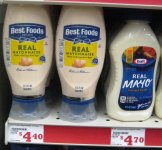

I was in Lowe’s the other day buying cleaning supplies. Prices are rather high.At mid-year 2023 I could see into 2024. A few market visionaries, at that time, began to discuss 2024. Those that stood on the sidelines, quietly, were hoping for a miracle. The multi- Billions of USD's this administration has been dolling out did nothing but kick the can down the road. Moody's was the only one with ball's enough to put words to paper when they began lowering ratings on both the banks and the US Government. This months CPI was nothing more than 'cooking the books" in order to hold down the COLA on all the retirees and pensioners.
I was in the Family Dollar Store in the big town of Darby, Montana this morning. Inflation is eye watering, even in small towns.
View attachment 8202355View attachment 8202356
Oddly, hooker prices have remained stable and are pretty much the same they were in 2019.
Not as much overhead for a hooker. But that's 4 years of additional wear and tear on those.I was in Lowe’s the other day buying cleaning supplies. Prices are rather high.
Oddly, hooker prices have remained stable and are pretty much the same they were in 2019.
Strippers looking to actually enroll in nursing school to get the free student loans.I was in Lowe’s the other day buying cleaning supplies. Prices are rather high.
Oddly, hooker prices have remained stable and are pretty much the same they were in 2019.
Let this sink in:
As the numbers are not adjusted for inflation, they showed a consumer able to keep ahead of price increases that have been prevalent over the past two years.


 www.cnbc.com
www.cnbc.com
As the numbers are not adjusted for inflation, they showed a consumer able to keep ahead of price increases that have been prevalent over the past two years.

Retail sales increased 0.7% in July, better than expected as consumer spending is holding up
The advanced retail sales report showed a seasonally adjusted increase of 0.7% for the month, better than the 0.4% Dow Jones estimate
Regional banks slide after Fed’s Kashkari advocates ‘significantly further’ capital regulation
Deja Vu............. More "regulations" were added after the S&L crash...... The same regulations are in place today.
There is no enforcement being carried out.
We the People" will foot the bill, again.
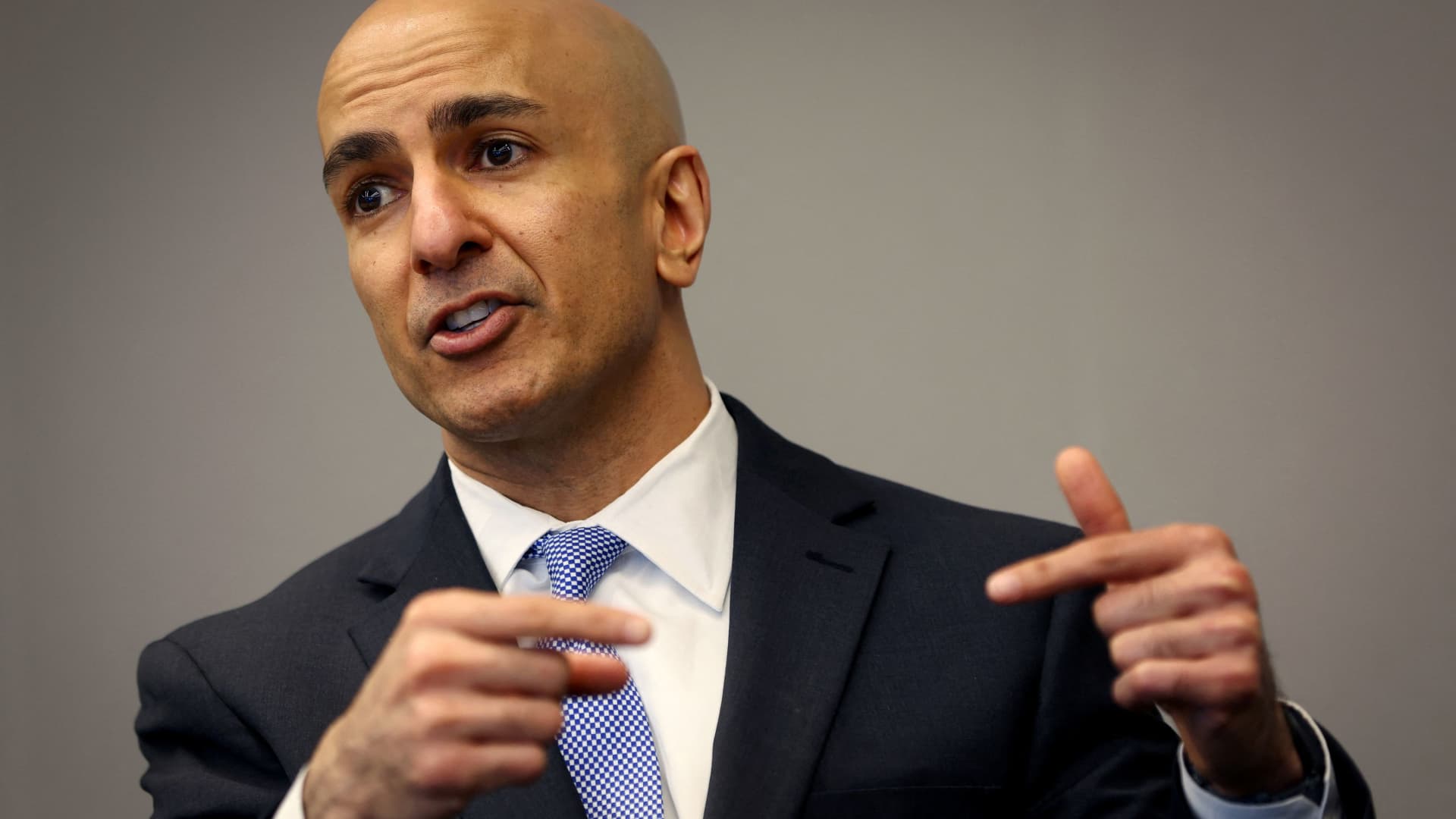
Regional banks slide after Fed's Kashkari advocates 'significantly further' capital regulation
The Minneapolis Fed president favors getting tougher on regional banks, following a crisis earlier this year that he said may not be over.
LOL.... Common sense says "That high income will end with one pink slip.... History repeating.

 www.cnbc.com
www.cnbc.com

Can you make so much money that your credit score doesn't matter? 'Absolutely not,' says banking expert
Earning a high income is nice, but having a high credit score is powerful.

Combine that with the average $690.75 Americans spend each month on food and out-of-pocket health expenditures that cost the average American $96.42 monthly, and you get a total expense of $2,816.17 for renters and $2,744.17 for homeowners.
That amount already accounts for just over 85% of the median take-home pay for average American renters and almost 83% for an average homeowner. This is excluding other essential expenses such as transportation, child care and debt payments.
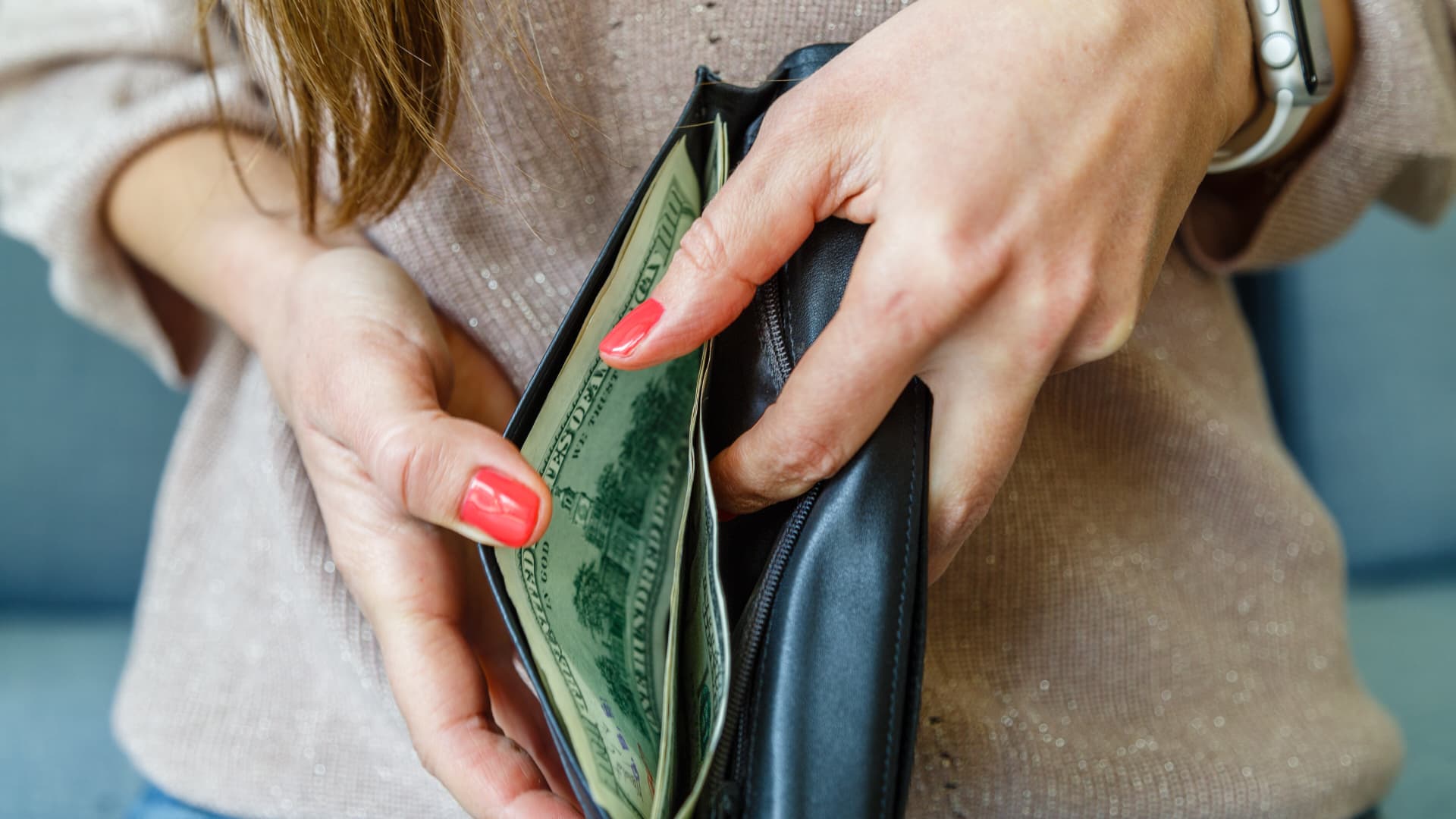
Here's why Americans can't stop living paycheck to paycheck
With well over half of Americans living paycheck to paycheck, many are failing to meet some of their modest financial goals.
Now, isn't this interesting.
___________
China’s heavily indebted property developer Evergrande group on Thursday filed for Chapter 15 bankruptcy protection in a U.S. court.
In a filing to the Manhattan bankruptcy court, the firm sought recognition of restructuring talks under way in Hong Kong, the Cayman Islands and the British Virgin Islands.
CNBC has reached out to Evergrande for comment but did not hear back.
The world’s most indebted property developer defaulted in 2021 and announced an offshore debt restructuring program in March. Trading of Evergrande shares have been suspended since March 2022.

 www.cnbc.com
www.cnbc.com
___________
China’s heavily indebted property developer Evergrande group on Thursday filed for Chapter 15 bankruptcy protection in a U.S. court.
In a filing to the Manhattan bankruptcy court, the firm sought recognition of restructuring talks under way in Hong Kong, the Cayman Islands and the British Virgin Islands.
CNBC has reached out to Evergrande for comment but did not hear back.
The world’s most indebted property developer defaulted in 2021 and announced an offshore debt restructuring program in March. Trading of Evergrande shares have been suspended since March 2022.

China's property giant Evergrande files for bankruptcy protection in Manhattan court
The world's most indebted property developer defaulted in 2021 and announced an offshore debt restructuring program in March.
The economy will trudge right along until the 24/7 media spooks the sheeple into a panic. All the ingredients are already in place for one hell of a depression. The only missing thing is a spark from the media handlers to set it in motion.
We have known this was worldwide for at least the past 2 - 3 years... All the signs were there..
That is why this recession is "different".

 www.cnbc.com
www.cnbc.com
That is why this recession is "different".

Ron Insana says economic windstorms are blowing around the world
There are additional pressures building globally that could cause a season of discontent both at home and abroad.
The "Great Reset" is worldwide. Thank Jerome Powell and the politician's.
Monday’s actions follow surprise cuts to its short- and medium-term lending rates last Tuesday after a raft of economic data pointed to weak credit growth and emerging deflation risks, intensifying fears of a rapidly slowing economy.

 www.cnbc.com
www.cnbc.com
Monday’s actions follow surprise cuts to its short- and medium-term lending rates last Tuesday after a raft of economic data pointed to weak credit growth and emerging deflation risks, intensifying fears of a rapidly slowing economy.

China's central bank trims 1-year rate, but unexpectedly leaves 5-year rate unchanged
Most household and corporate loans in China are based on the PBOC's one-year loan prime rate, while mortgages are pegged to the five-year rate.
A blind man could have seen this coming.
_____________
A new analysis from Moody’s Analytics found consumers are spending $709 more on everyday goods in July compared to two years ago. One-third of all U.S. households spent more than 30% of their income on housing in 2021, according to recently released data from Harvard’s Joint Center for Housing Studies.
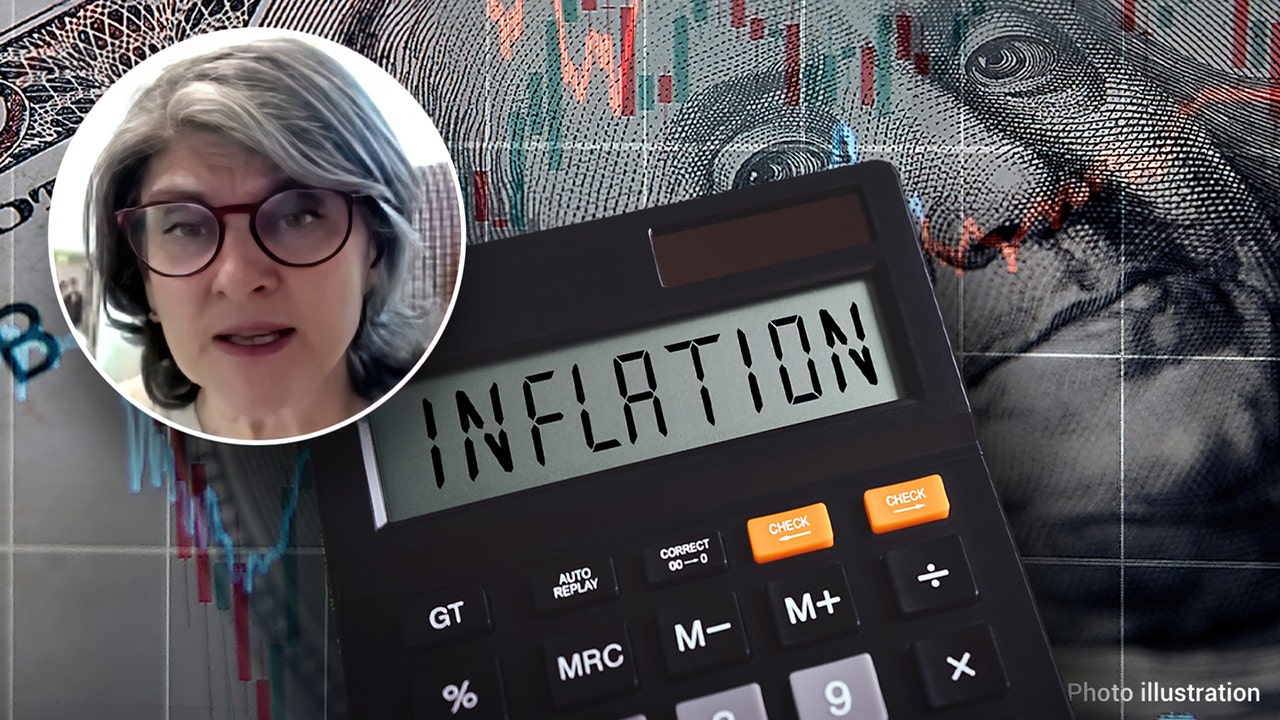
US economist warns Americans to ‘hunker down’ and ‘save your pennies’ as economy overheats
Urging Americans to be careful with credit cards and get ready to "hunker down," Piper Sandler's Nancy Lazar details the policy change needed to see an economic turnaround.
Hank jr. something about a country boy survivingView attachment 8209281
A blind man could have seen this coming.
_____________
A new analysis from Moody’s Analytics found consumers are spending $709 more on everyday goods in July compared to two years ago. One-third of all U.S. households spent more than 30% of their income on housing in 2021, according to recently released data from Harvard’s Joint Center for Housing Studies.

US economist warns Americans to ‘hunker down’ and ‘save your pennies’ as economy overheats
Urging Americans to be careful with credit cards and get ready to "hunker down," Piper Sandler's Nancy Lazar details the policy change needed to see an economic turnaround.www.foxbusiness.com
We have survived a lot of changes since 1982, but 41 years later the theme has not changed much.Hank jr. something about a country boy surviving
____________________________
This song was released in January 1982. It reflects changes to American lifestyle and society that corresponded with rural concerns of the negative impact from increasing urbanization, and exalts the self-reliance of 'country boys'.
The second verse mentions the narrator's relationship with a New York City businessman; despite their differing backgrounds (urban vs. rural) the two had become good friends and exchanged gifts ("he'd send me pictures of the Broadway nights/And I'd send him some homemade wine"). The businessman is "killed by a man with a switchblade knife/for $43 my friend lost his life"; Williams replies that he would like to personally shoot the mugger himself, but not before "(spitting) Beech-Nut in that dude's eyes".

A Country Boy Can Survive - Wikipedia
Inflation is booked in for the next 4 years....
The more than 15,000 pilots at American will get immediate raises of 21% with compensation rising more than 46% over the duration of the four-year contract, including 401k contributions, their union said Monday.

 www.cnbc.com
www.cnbc.com
The more than 15,000 pilots at American will get immediate raises of 21% with compensation rising more than 46% over the duration of the four-year contract, including 401k contributions, their union said Monday.

American Airlines pilots approve sweetened labor deal with big raises
American follows Delta in sealing a labor deal with its pilots this year.
Cash is King in the housing arena.

 www.cnbc.com
www.cnbc.com

Mortgage rates hit their highest point since 2000
Mortgage rates hit the highest level since the end of 2000, and that is crushing affordability for potential homebuyers.
S&P Global on Monday cut credit ratings and revised its outlook for multiple U.S. banks, following a similar move by Moody’s, warning that funding risks and weaker profitability will likely test the sector’s credit strength.
S&P downgraded the ratings of Associated Banc-Corp and Valley National Bancorp
on funding risks and a higher reliance on brokered deposits.
It also downgraded UMB Financial Corp, Comerica Bank and Keycorp, citing large deposit outflows and prevailing higher interest rates.

 www.cnbc.com
www.cnbc.com
S&P downgraded the ratings of Associated Banc-Corp and Valley National Bancorp
on funding risks and a higher reliance on brokered deposits.
It also downgraded UMB Financial Corp, Comerica Bank and Keycorp, citing large deposit outflows and prevailing higher interest rates.

S&P downgrades multiple U.S. banks citing 'tough' operating conditions
The collapse of Silicon Valley Bank and Signature Bank sparked a crisis of confidence in the sector, leading to a run on deposits at a host of regional banks.

Americans now need to spend 43% of their income to afford a home as mortgage rates surge to a 23-year high
"US housing affordability is worse today than the peak of the last housing bubble," market expert Charlie Bilello said in a post on X.
This is why nobody feels like working a $15 an hour job.
That and making more than $15 per hour on government dole
Americans now need to spend 43% of their income to afford a home as mortgage rates surge to a 23-year high
"US housing affordability is worse today than the peak of the last housing bubble," market expert Charlie Bilello said in a post on X.www.yahoo.com
This is why nobody feels like working a $15 an hour job.
Yeah, we’re at an interesting point in America right now. The dream is getting so far away for people that they might just give up.That and making more than $15 per hour on government dole
Yeah, we’re at an interesting point in America right now. The dream is getting so far away for people that they might just give up.
I hope they at least put up a fight, starting with just saying no.
When the financials move into a "vicious cycle" the outcome will be bad for "We the People"...
Americans now need to spend 43% of their income to afford a home as mortgage rates surge to a 23-year high
"US housing affordability is worse today than the peak of the last housing bubble," market expert Charlie Bilello said in a post on X.www.yahoo.com
This is why nobody feels like working a $15 an hour job.
Not so bad for the swamp dwellers, at first.
FED Reserve says:
Those "players" on the government dole are pulling down $100k in benefits every year.That and making more than $15 per hour on government dole
This is why a working stiff has to make $140k / year just to keep his head above water.
Ponder this old saying:Yeah, we’re at an interesting point in America right now. The dream is getting so far away for people that they might just give up.
You never want to get into a fight with a man who has nothing to lose.
There is an old book and movie around titled "The Road"......... I read the book.
Watched the DVD movie last night before bedtime. Got the best night's sleep I have had in a long time.
Having a glimpse of the future can be calming to some.
Watched the DVD movie last night before bedtime. Got the best night's sleep I have had in a long time.
Having a glimpse of the future can be calming to some.
The mortgage rates are not the problem. We have dealt with significant higher rates.
Americans now need to spend 43% of their income to afford a home as mortgage rates surge to a 23-year high
"US housing affordability is worse today than the peak of the last housing bubble," market expert Charlie Bilello said in a post on X.www.yahoo.com
This is why nobody feels like working a $15 an hour job.
https://infogram.com/br-historical-mortgage-rates-1h7j4dv0pkzw94n
What makes the American Dream a nightmare for many is that the increase in house prices and inflation have outpaced by far the measly wage increases.
https://dqydj.com/historical-home-prices/
TLDR: House price have quadrupled since the nineties. Your wages did not.
Similar threads
- Replies
- 84
- Views
- 4K
- Replies
- 26
- Views
- 2K
- Replies
- 39
- Views
- 2K
